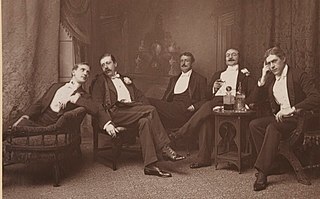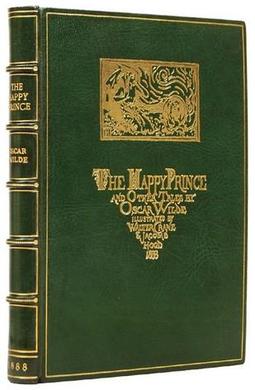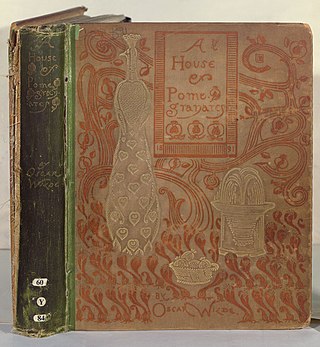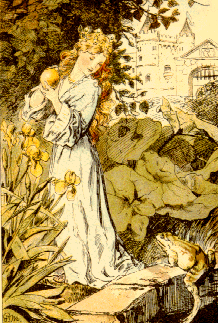
Oscar Fingal O'Fflahertie Wills Wilde was an Irish poet and playwright. After writing in different forms throughout the 1880s, he became one of the most popular playwrights in London in the early 1890s. He is best remembered for his epigrams and plays, his novel The Picture of Dorian Gray, and his criminal conviction for gross indecency for homosexual acts.

The Picture of Dorian Gray is a philosophical fiction and gothic horror novel by Irish writer Oscar Wilde. A shorter novella-length version was published in the July 1890 issue of the American periodical Lippincott's Monthly Magazine. The novel-length version was published in April 1891.

George V was King of the United Kingdom and the British Dominions, and Emperor of India, from 6 May 1910 until his death in 1936.

Lord Alfred Bruce Douglas, also known as Bosie Douglas, was an English poet and journalist, and a lover of Oscar Wilde. At Oxford University he edited an undergraduate journal, The Spirit Lamp, that carried a homoerotic subtext, and met Wilde, starting a close but stormy relationship. Douglas's father, John Douglas, 9th Marquess of Queensberry, abhorred it and set out to humiliate Wilde, publicly accusing him of homosexuality. Wilde sued him for criminal libel, but some intimate notes were found and Wilde was later imprisoned. On his release, he briefly lived with Douglas in Naples, but they had separated by the time Wilde died in 1900. Douglas married a poet, Olive Custance, in 1902 and had a son, Raymond.

Lady Windermere's Fan, A Play About a Good Woman is a four-act comedy by Oscar Wilde, first performed on Saturday, 20 February 1892, at the St James's Theatre in London.
This article contains information about the literary events and publications of 1895.

The Happy Prince and Other Tales is a collection of stories for children by Oscar Wilde, first published in May 1888. It contains five stories that are highly popular among children and frequently read in schools: "The Happy Prince," "The Nightingale and the Rose," "The Selfish Giant," "The Devoted Friend," and "The Remarkable Rocket."

Gyles Daubeney Brandreth is a British broadcaster, writer and former politician. He has worked as a television presenter, theatre producer, journalist, author and publisher.

A House of Pomegranates is a collection of fairy tales written by Oscar Wilde published in 1891 as a second collection for The Happy Prince and Other Tales (1888). Wilde once said that this collection was "intended neither for the British child nor the British public".

Salome is a one-act tragedy by Oscar Wilde. The original version of the play was first published in French in 1893; an English translation was published a year later. The play depicts the attempted seduction of Jokanaan by Salome, stepdaughter of Herod Antipas; her dance of the seven veils; the execution of Jokanaan at Salome's instigation; and her death on Herod's orders.

Josephine of Leuchtenberg, also Josefina, was Queen of Sweden and Norway from 8 March 1844 to 8 July 1859 as the wife of King Oscar I. She was also Princess of Bologna from birth and Duchess of Galliera from 1813. She was regarded as politically active during the reign of her spouse and acted as his political adviser, actively participating in government affairs. She is acknowledged as having introduced more liberal laws regarding religion.

"The Frog Prince; or, Iron Henry" is a German fairy tale collected by the Brothers Grimm and published in 1812 in Grimm's Fairy Tales. Traditionally, it is the first story in their folktale collection. The tale is classified as Aarne-Thompson type 440.
The Cleveland Street scandal occurred in 1889, when a homosexual male brothel and house of assignation on Cleveland Street, London, was discovered by police. The government was accused of covering up the scandal to protect the names of aristocratic and other prominent patrons.

Princess Sophia was the twelfth child and fifth daughter of King George III and Queen Charlotte. Sophia is perhaps best known for the rumours surrounding a supposed illegitimate child to whom she gave birth as a young woman.

Princess Alice was Grand Duchess of Hesse and by Rhine from 13 June 1877 until her death in 1878 as the wife of Grand Duke Louis IV. She was the third child and second daughter of Queen Victoria of the United Kingdom and Prince Albert of Saxe-Coburg and Gotha. Alice was the first of Queen Victoria's nine children to die, and one of three to predecease their mother, who died in 1901. Her life had been enwrapped in tragedy since her father's death in 1861.

De Profundis is a letter written by Oscar Wilde during his imprisonment in Reading Gaol, to his friend Lord Alfred "Bosie" Douglas.

Reginald Turner was an English author, an aesthete and a member of the circle of Oscar Wilde. He worked as a journalist, wrote twelve novels, and his correspondence has been published, but he is best known as one of the few friends who remained loyal to Wilde when he was imprisoned and who supported him after his release.

Harold Bloom was an American literary critic and the Sterling Professor of humanities at Yale University. In 2017, Bloom was called "probably the most famous literary critic in the English-speaking world". After publishing his first book in 1959, Bloom wrote more than 50 books, including over 40 books of literary criticism, several books discussing religion, and one novel. He edited hundreds of anthologies concerning numerous literary and philosophical figures for the Chelsea House publishing firm. Bloom's books have been translated into more than 40 languages. He was elected to the American Philosophical Society in 1995.
Mary De Morgan was an English writer and the author of three volumes of fairytales: On a Pincushion (1877); The Necklace of Princess Fiorimonde (1880); and The Windfairies (1900). These volumes appeared together in the collection The Necklace of Princess Fiorimonde – The Complete Fairy Stories of Mary De Morgan, published by Victor Gollancz Ltd in 1963, with an introduction by Roger Lancelyn Green.

Robin de la Condamine was an English actor who used the stage name Robert Farquharson. Harold Acton wrote that he was "our last great actor" in the tradition of Henry Irving and that he was known for his "emphatic stammer" and his dandyish ways.
















